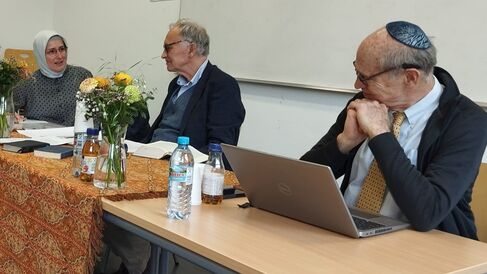
Awarded by the University of Tübingen’s Faculty of Protestant Theology, the Leopold Lucas Prize honours the memory of the Jewish rabbi and scholar Dr Leopold Lucas, who died at Theresienstadt concentration camp in 1943.
Professor Peter Ochs has been recognised for his role in the development and dissemination of Scriptural Reasoning [SR]. Preparing to receive the award, he reflected:
“PEW research reports indicate that religion-on-religion violence is steadily increasing. Should we infer that intense religiosity is dangerous? In 1994, a society of Muslim, Jewish, and Christian scholars began to test a different set of hypotheses: that modern diplomats do a disservice when they ask religious groups to leave their beliefs at home when they come to the negotiating table; and that the greatest resource for interreligious peacebuilding lies deep within these religious traditions, in their ancient practices of Scriptural study.
“SR offers tables of sacred text study rather than of negotiation; the air is filled words of value and belief and, against expectations, that atmosphere has comforted religious participants much more often than it has unsettled them.”
Learning from creation and instruction
At the prize-giving ceremony in Tübingen, Professor Ochs delivered a lecture on the teachings of the rabbinic leader and physicist Hasdai Crescas (1340–1410), according to whom Torah (divine instruction) and natural science (studies of the creation) are correlative. He summarises:
“In religious terms this means that God’s word appears both as the order of creation (maaseh breshit) and as the instruction (Torah) that appears in Scripture. In their commentaries on Scripture, the rabbinic sages read each word of Scripture as having more than one meaning, because the meaning of each word may apply somewhat differently to each situation of earthly life. For the sages, God’s knowledge is infinite while human knowledge is finite. Examining scriptural words, even the wisest sage asks only ‘what do these words say to us here in this finite situation right now?’
“Crescas taught that faith in God means trusting that we will continue to learn more and more about God’s word of Torah and about God’s words in creation, where every creature is a word of God. Alongside his rabbinic leadership, Crescas was the leading mathematical physicist of his day, generating a mathematics of infinite space and time that anticipates some of the moves in 20th century particle physics. Crescas taught that the physicist should also trust the creator and therefore trust that that there will always be more to learn about the universe.
“In his physics, Crescas applied Scripture’s account of divine infinity to his notion of the infinite character of the universe. In his accounts of rabbinic jurisprudence, Crescas’s applied some of the details of his mathematics to his notion of the infinite character of Torah.”
Supported by technical work in logic and philosophy
Reflecting on the intellectual work that underpins his practice of Scriptural Reasoning, Ochs commented:
“My research team’s public work on inter-religious relations is supported by technical work in logic and philosophy, which generates our models of how reasoning emerges from scriptural reading and how religious language use signals a group’s future behavior. The technical work draws, for one, on the great American philosopher Charles Peirce (1839-1914), especially his logic of science, pragmatism, and semiotics (that to know is to interpret signs).
“Applying Peirce’s semiotics to scripture-based reasoning, we are aided by tradition-specific thinkers, like Hasdai Crescas, Augustine, and South Asian thinkers like Shah Wali Allah and ʿUbayd Allāh Sindhī. All these thinkers correlate religion and science, and all read the words of scripture and the subjects of science as displaying not only one but a range of meanings that speak differently to different settings.”
Peter Ochs is Professor Emeritus at the University of Virginia, where he was Edgar M. Bronfman Professor of Modern Judaic Studies from 1997 to 2021. He is a longstanding supporter of the Cambridge Interfaith Programme, and the practice of Scriptural Reasoning was a keen stimulus to CIP’s creation.
The significance of this occasion
CIP’s former and founding director, Emeritus Professor David Ford, was in attendance at the award ceremonies and reports:
“[T]he University’s judges for the prize (some of whom I met) had studied Peter’s philosophy seriously and . . . had appreciated the significance of Scriptural Reasoning.
“Professor Lejla Demiri, Chair of Islamic Doctrine at the University’s Centre for Islamic Theology, also invited Peter and myself to be alongside her in leading two sessions in the Scriptural Reasoning course that she was teaching. It was most encouraging to see the Centre thriving and attracting students from other parts of the university into Scriptural Reasoning.”
The prize was announced on 24 February, and awarded in Tübingen on Tuesday 9 May.
From Virginia to Germany
Ochs' former PhD student Dr Daniel Weiss has been Coexist–Polonsky (Senior) Lecturer in Jewish Studies at the University of Cambridge since 2010. He is visiting Tübingen this year as part of a Humboldt Research Fellowship, enabling him to witness proceedings. Daniel reflects:
“I was really glad to be able to be present for the Prize lecture. The topic conveyed Peter’s longstanding reflections on SR and inter-communal relations, and its intellectual frameworks—philosophical and theological—for a diverse audience. And successfully—it was very well received.
“I’m grateful to have been able to learn from his insights in Virginia, in Cambridge (where he gave the 2015 Stanton Lectures) and now in Germany!”
The text of Professor Ochs’ lecture, entitled ‘From rabbinic reasoning to Scriptural Reasoning: reasoning for repair’, is available to download below.
The featured image shows Professor Peter Ochs (right), Professor David Ford, and Professor Lejla Demiri, engaged in Scriptural Reasoning at the University of Tübingen—shared here with thanks to Professor Demiri.
